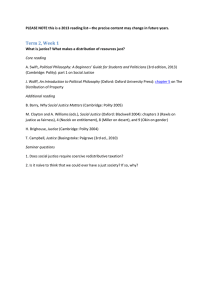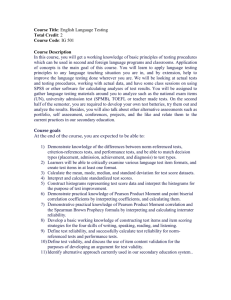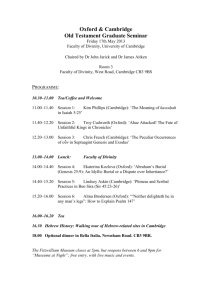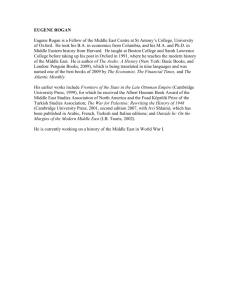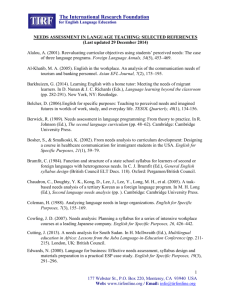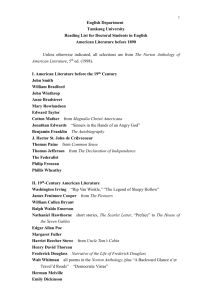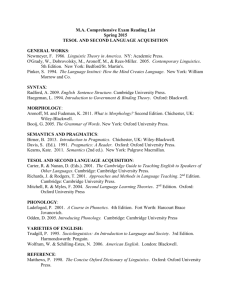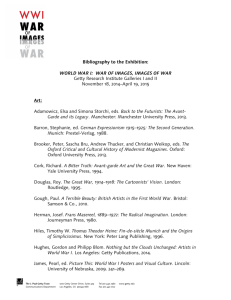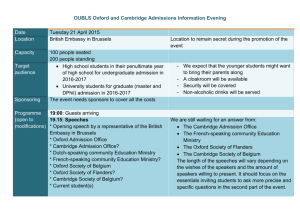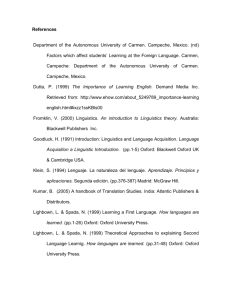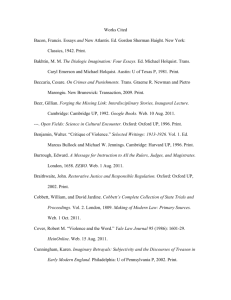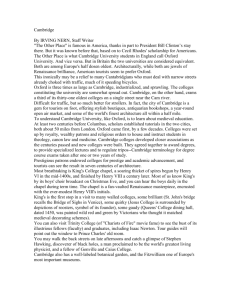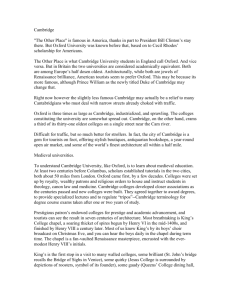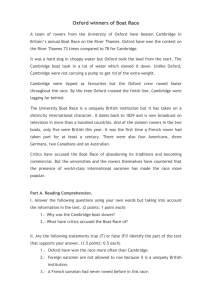English for Specific Purposes - Department of LD
advertisement
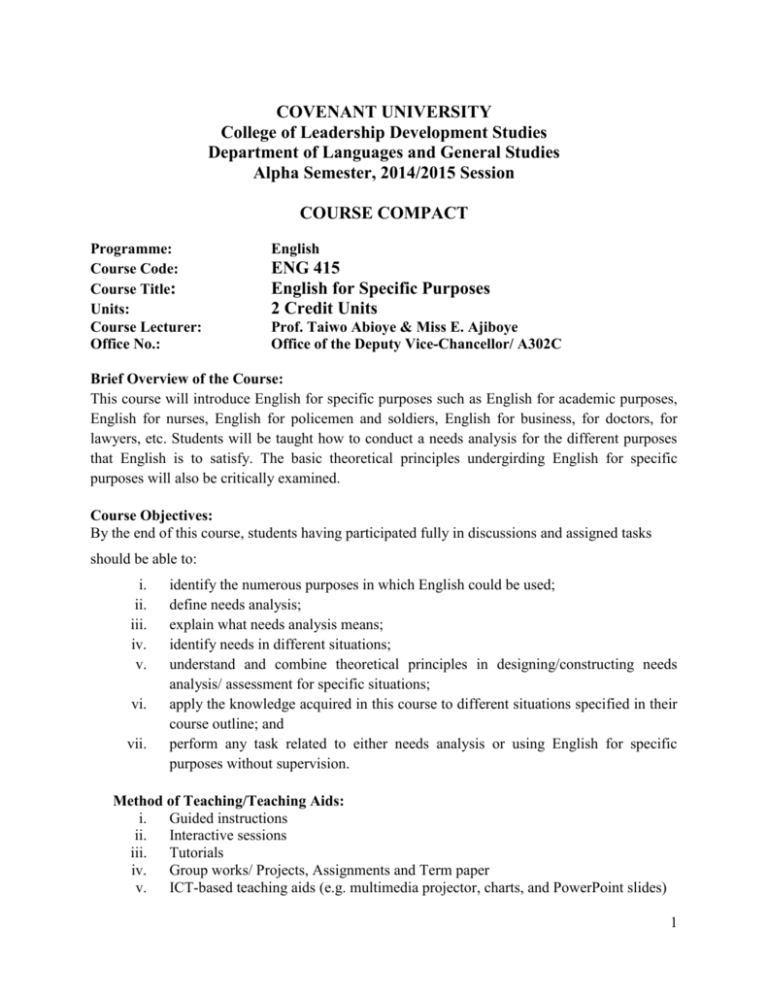
COVENANT UNIVERSITY College of Leadership Development Studies Department of Languages and General Studies Alpha Semester, 2014/2015 Session COURSE COMPACT Programme: Course Code: Course Title: Units: Course Lecturer: Office No.: English ENG 415 English for Specific Purposes 2 Credit Units Prof. Taiwo Abioye & Miss E. Ajiboye Office of the Deputy Vice-Chancellor/ A302C Brief Overview of the Course: This course will introduce English for specific purposes such as English for academic purposes, English for nurses, English for policemen and soldiers, English for business, for doctors, for lawyers, etc. Students will be taught how to conduct a needs analysis for the different purposes that English is to satisfy. The basic theoretical principles undergirding English for specific purposes will also be critically examined. Course Objectives: By the end of this course, students having participated fully in discussions and assigned tasks should be able to: i. ii. iii. iv. v. vi. vii. identify the numerous purposes in which English could be used; define needs analysis; explain what needs analysis means; identify needs in different situations; understand and combine theoretical principles in designing/constructing needs analysis/ assessment for specific situations; apply the knowledge acquired in this course to different situations specified in their course outline; and perform any task related to either needs analysis or using English for specific purposes without supervision. Method of Teaching/Teaching Aids: i. Guided instructions ii. Interactive sessions iii. Tutorials iv. Group works/ Projects, Assignments and Term paper v. ICT-based teaching aids (e.g. multimedia projector, charts, and PowerPoint slides) 1 Course Outline: Module 1: English for Specific Purposes - Introduction Week 1: Definition and introduction Week 2: Description of English for Specific Purposes (ESP) – Characteristics, etc. Module 2: Week 3: Week 4: Week 5: Needs Analysis Needs Analysis- Introduction Identifying and examining theoretical principles underlying needs analysis Conducting needs analyses Module 3: Week 6: English for Academic Purposes Using English for specific purposes in academic situations such as seminars, reviews, analysis, synthesis, etc. Mid-semester exam Week 7: Module 4: Week 8: Week 9: Week10: Week11: Week12: Week 13: English for Occupational Purposes (EOP) Register Language of science and medicine Language of religion Language of law- legal documents, affidavits, agreements, etc. Language of the press—adverts, broadcasting, articles, and news reports, etc. Language of administration e.g. applications, minutes of meetings, report writing, etc. Revision Structure of Programme / Method of Grading: Continuous Assessment End of semester exam TOTAL 30% 70% 100% Ground Rules/ Regulations Attendance is compulsory. Noise-making, talking and other forms of unruly behaviour will not be tolerated. Students are expected to participate fully in all class activities for them to earn their grades. Assignments/projects must be submitted by the specified dates. To participate in examinations, a minimum of 75% class attendance is required. Topics for Term Paper/Assignments: Each topic is followed by exercises activities. However, the following areas will be emphasised: i. What do you understand by English for Specific Purposes? ii. How is English for Specific Purposes different from General English? iii. What should comprise a needs analysis? Illustrate this. iv. Briefly describe English for Academic Purposes. v. Why is ‘register’ important to language use? Recommended Reading: 2 Allurite, R. (1979). “Language Learning through Communication Practice.” In C. J. Brumfit & K. Johnson (eds) The Communicative Approach to Language Teaching, Oxford:Oxford University Press. Brumfit, C. (1984). “Communicative Methodology in Language Teaching: The Roles of Fluency Accuracy. Cambridge: Cambridge University Press. Dudley-Evans, T., & St John, M. (1998). Developments in ESP: A Multi-disciplinary Approach. Cambridge: Cambridge University Press. Hutchinson, T., & Waters, A. (1987). English for Specific Purposes: A Learning-Centered Approach. Cambridge: Cambridge University Press. Johns, A., & Dudley-Evans, T. (1991). English for Specific Purposes: International in scope, specific in purpose. TESOL Quarterly, 25, 297-314. Mackay, R., & Mountford, A. (Eds.). (1978). English For Specific Purposes: A Case Study Approach. London: Longman. Munby, J.(1978 ). Communicative Syllabus Design. Cambridge: Cambridge Univ. Press. Olaofe, I.A. (1991). English and Communication Skills for Academic Purposes. Zaria: Tamaza Publishing. Omojuyigbe, D. (2005.) Writing for Specific purposes: A Professional Approach. Lagos: New Deo Communications. Relevant journals and the Internet. Strevens, P. (1980). Teaching English as an International Language: From Practice to Principle. Oxford: Oxford University Press. Tomlinson, B.(2003). Developing Materials for Language Teaching. London: Continuum. White R.W. (1988). “Academic Writing: Process and Product” In Robinson (ed) ELT Journal 129, MEP/ The British Council, 16-23. Widdowson, H.G. (1978). Teaching Language as Communication, Oxford: Oxford University Press. 3

